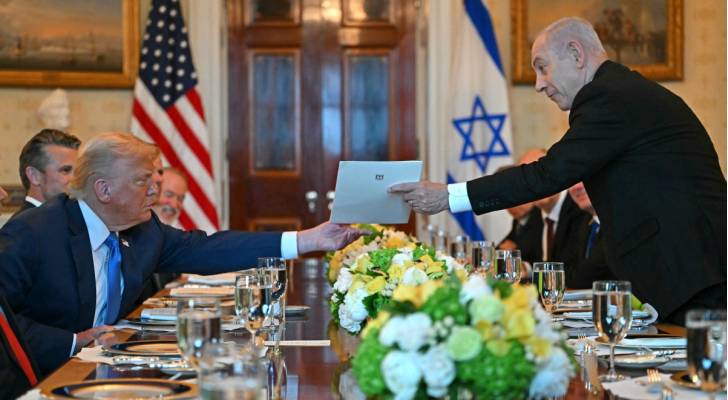'Israeli' Prime Minister Benjamin Netanyahu hands over a letter to US President Donald Trump (Credit: AFP)
Key points: What came out of Netanyahu, Trump’s latest meeting?
US President Donald Trump hosted 'Israeli' Prime Minister Benjamin Netanyahu at the White House for a closed-door dinner, marking their third high-level encounter within six months.
Bolstering the US-'Israel' alliance
The meeting opened with Netanyahu sharing his recent conversations with US Secretary of State Marco Rubio and Special Envoy Steve Witkoff, emphasizing shared challenges at both regional and global levels.
“I expressed the gratitude of all Israelis and their admiration for President Trump’s leadership of the free world,” Netanyahu told reporters. “Our teams together provide a great team, and President Trump is shaping peace in the region.”
President Trump reciprocated these sentiments, highlighting the robust cooperation between the US and 'Israel' and its neighbors. “We have excellent cooperation with Israel’s neighboring countries. Something good is going to happen,” Trump said.
On Palestine
Central to the talks was the ongoing war on Gaza. Trump described Hamas as “wanting to negotiate and reach a ceasefire,” noting that “there are no major obstacles” to ending hostilities. He expressed hope that the situation would improve without further military strikes against Iran.
Netanyahu echoed this cautious optimism, but underscored 'Israel’s' security imperatives. “Palestinians can govern themselves, but they cannot threaten us,” he said firmly. He stressed that while 'Israel' is open to peace with Palestinians who renounce violence, security control must remain firmly in 'Israeli' hands. “We can achieve broad peace in the Middle East, including all our neighbors,” Netanyahu added.
Negotiations are continuing indirectly in Qatar between 'Israeli' and Hamas representatives, with US envoy Steve Witkoff expected to join talks this week to help finalize a ceasefire agreement.
On Iran
A significant portion of the meeting focused on Iran’s role in regional dynamics. Trump described recent US strikes against Iranian nuclear sites as “historic victories” that have “changed the face of the Middle East.” He indicated that these military actions have diminished Iran’s nuclear threat and opened opportunities to expand the Abraham Accords, the series of normalization agreements between 'Israel' and several Arab states.
Netanyahu reiterated the importance of these joint efforts. “Our combined capabilities helped eliminate two threats to Israel, nuclear weapons and ballistic missiles from Iran,” he said. Netanyahu also referred to a potential upcoming meeting between US negotiators and Iranian officials, possibly as soon as next week, to explore further diplomatic engagement.
Broader diplomatic outreach
Trump shared insights from recent visits to Saudi Arabia, Qatar, and the UAE, praising the intelligence and pragmatism of their leaders.
“I talked to very smart leaders,” Trump said.
Both leaders discussed plans to ease sanctions on Syria, contingent on positive developments. Trump expressed willingness to lift some sanctions to allow Syria to rebuild, stating, “We gave Syria a chance.” Netanyahu agreed.
Other discussions
Amid these regional discussions, Trump weighed in on US domestic politics, criticizing the New York mayoral candidate, Zohran Mamdani, whom he described as “not a socialist but a communist” with “very bad comments about Jews."
In a significant political gesture, Netanyahu announced he had officially nominated President Trump for the Nobel Peace Prize, praising his “historic leadership” and role in “drawing peace in the region.”




